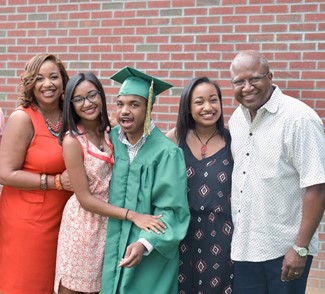Like most learning events this past year, Family Weekend was no different. On April 17th, from 8:45 to 12:00, we had seven families and two students seeking internship hours participate in the event. We had three presenters: a mother and daughter duo, Djenne-amal Morris and Imani Morris, and Dr. Holly Pederson, Department Chair of Special Education at Minot State University.
Imani shared her journey from a sibling perspective as her brother, Malik, was born with CHARGE syndrome. While only 13 months older than her brother Malik, she took on the role as one of his caretakers and it was later in life she learned how to be a sister. Malik had a lot of health issues, and they spent a lot of time in and out of hospitals. Imani’s parents empowered her by allowing her to be involved in every aspect of Malik’s care. Open communication was key for their family. As a sister, she felt guilty leaving him and even experienced separation anxiety when she went away to college. 
Djenne shared her challenges, joys, and lessons learned along the way of raising a child with a disability and its impact on the whole family. In her presentation, “I Can See Clearer Now,” she shared three learning points: creating and re-creating a vision for your child, sustaining and maintaining your vision, and sharing that vision. At first, they weren’t sure what their vision was for Malik. He had a lot of health issues and at times they wondered if he would even live. Because of this, their vision for Malik was ever changing. Djenne shared the quote, “Vision is the art of seeing what is invisible to others” by Jonathan Swift. They didn’t always see what was next for Malik.
At times Djenne would ask, “why me” and get angry about the situation. These are all very valid feelings that you can experience and it’s OK to have them. Djenne shared the Helen Keller quote, “When one door of happiness closes, another opens, but often we look so long at the closed door that we do not see the one which has been opened for us.” It was easy to keep focusing on the “what might have been” vs “what is in front of them.”
And finally, share your vision, be a storyteller. Djenne shared the quote, “Vision without action is merely a dream. Action without vision just passes the time. Vision with action can change the world” by Joel Barker. As a parent you need to build your village and find your network of support. It might be professionals working with your child and/or as she called it, your personal board of directors! Who is your core support to turn to? And with this network, you learn to collaborate with them and build this community.
In Dr. Holly Pederson’s presentation, “What’s So Special About Dads?” She shared her experience working as an Early Interventionist and how one dad in particular helped her grow as an early interventionist.
Sometimes dads don’t know their role and what is expected of them when service providers are in the home. It is easy to feel like a third wheel in the room. As Holly put it, “estrogen poisoning” as there are so many females within these fields. She discovered that to make that connection with dads, sometimes they do better when given a task. You must make it a point to directly involve them in your visit. You must set up ways for dads to participate or engage in the developmental growth plan for their child. It’s important to encourage dads to share their story as storytelling connects people, touches hearts, and can change minds. It’s easy for us to make assumptions about dads who might leave the room when we come or have a different parenting style. We need to treat them as equal learning partners. If fathers are involved, the overall health of the family is better.
